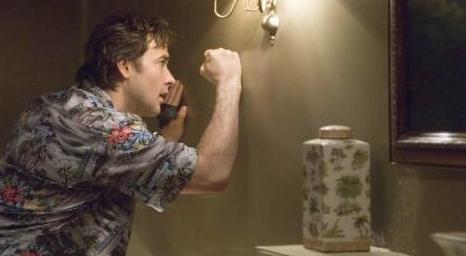Like a Molotov cocktail, 1408 explodes on to the horror scene, bursting with energy. The film is an exuberant piece of work, full of frights, shocks, and a strong performance by John Cusack. The story, directed by Mikael Hafstrom, takes its cues from the Stephen King short story, which was about a skeptical haunted hotel writer who stayed in a genuinely haunted room. This film embellishes that quick, creepy read and turns it into a rousing and scary nightmare, where the room assaults author Michael Enslin with one psychological twist after another.
Hauntings are great for little goosebump moments, but rarely become threatening, because the villains are usually ethereal, misunderstood, and end up needing the hero�s help. This film enjoys subverting that tendency. If there are ghosts in 1408, they are not the foundation of the room�s evil, but a symptom. The baser evil is difficult to quantify. As Sam Jackson�s Olin notes, �It�s an evil fucking room.�

Rather than reveal its origins, the room reveals much more about Enslin�s past, which contains the requisite demons that come back to haunt him. His most troubling memories are about his daughter, who suffered from some sort of fatal disease that�s never explained. Call it plot-itis. Her spectre hangs over Cusack�s mind throughout the whole movie, fueling his skepticism of God and spirit. How convenient for him, then, that 1408 is a sign of the Great Unknown.
The film has obligatory opening scenes where Olin, the owner of the hotel, is quick to dissuade Enslin from spending the night in 1408. Samuel L. Jackson is a great choice. As the writers explained at my screening, Tarantino offered this advice for casting. �No one�s gonna be scared of the room if Ian Holm or Michael Caine is the hotel manager. But if Samuel L. Jackson refuses to go in the room��
Nevertheless, Enslin ignores Olin, takes the key (it�s his legal right, apparently), and walks up the thirteen flights to room 1408. An extreme close-up of his key turning the lock mechanism announces that the film proper is about to begin.
And once it begins, it rarely lets up. The film�s best scares are smaller ones, the entry-level ones that announce the hotel room is warming up for Enslin. Little creaks and sounds. Two chocolates suddenly appear on his bed. These moments manage to generate a lot of tension with very little effort, and it�s to Hafstrom�s credit that he keeps those moments going as long as he can. Enslin initially approaches the situation like a kid looking for the rabbit at a magic show.
Of course, there must be escalation so that there can be the development of plot and character, and so eventually the haunting elements become a lot more overt and loud. Some of those moments succeed, but, unfortunately, most don�t. Most irritating of all is the eventual crashing loudness of scenes that involve the hotel room flooding and exploding. Am I giving that away? I hope not. Those images are in all the trailers and publicity.
Does that largeness ruin the film? No, thank heaven, because the writers have a trump card: the room�s inherent ambiguity. Think about the concept: a room that messes with your head. Even if you got out, could you be sure you ever left? Could you ever be certain that the room wasn�t still laughing at you? That uncertainty gives the film a level of interest, and keeps us moving through bizarre plot developments, including a sequence that seems like a rebuke to other recent twist endings.
John Cusack has stayed out of this genre, save his work in the underrated Identity. But here, he shows that there�s life for him beyond feel-good comedies like America�s Sweethearts and Must Love Dogs. Scenes that don�t really deserve emotional resonance get it anyway, thanks to his modulated performance. No matter how absurd the room gets in its psyche-out efforts, Mike Enslin responds with emotion and reality. It�s this element that keeps 1408 together as a fun spook story, and gives it a chance for resonance. After a year of somewhat disappointing horror offerings, 1408 is a breath of fresh air.



